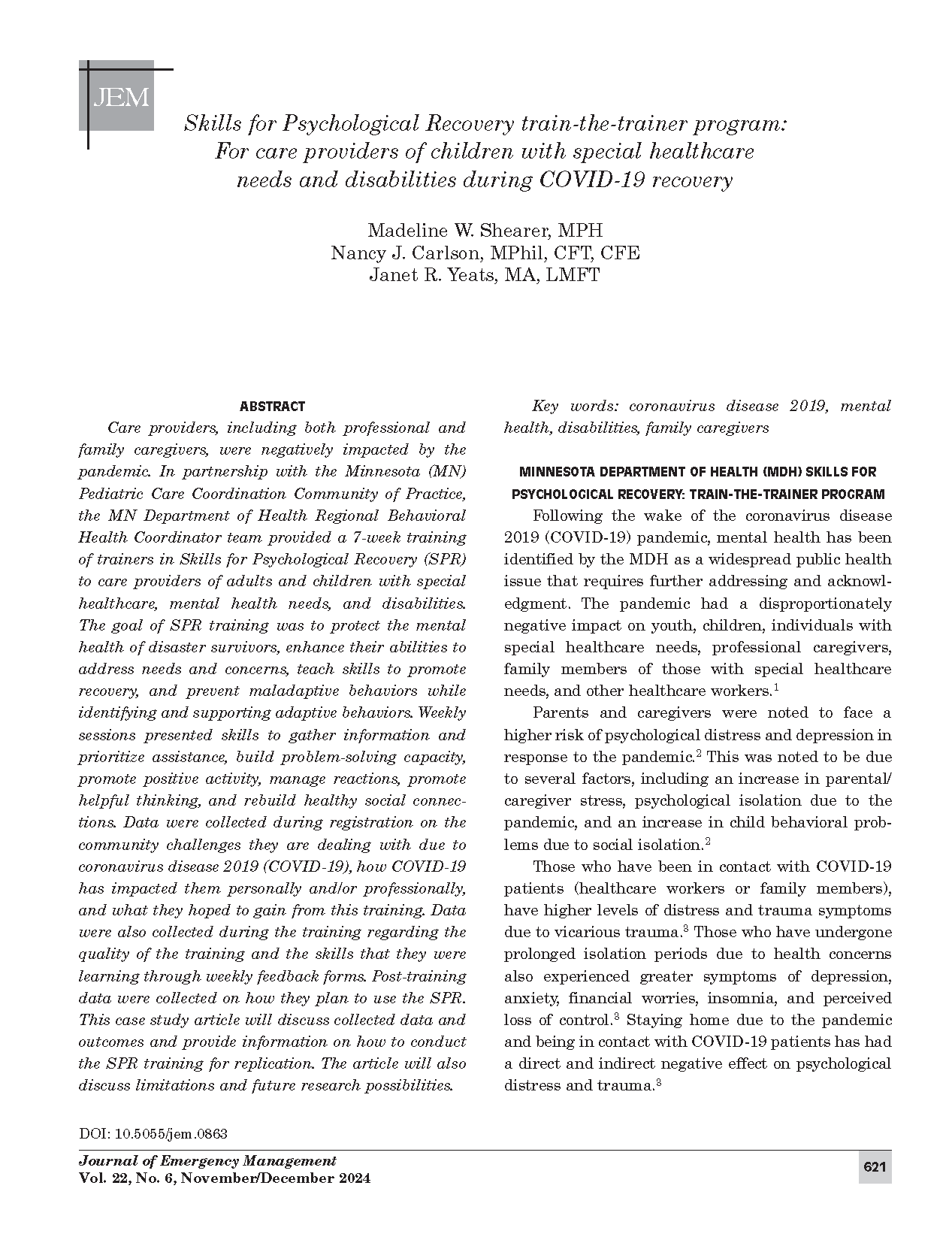Skills for Psychological Recovery train-the-trainer program: For care providers of children with special healthcare needs and disabilities during COVID-19 recovery
DOI:
https://doi.org/10.5055/jem.0863Keywords:
coronavirus disease 2019, mental health, disabilities, family caregiversAbstract
Care providers, including both professional and family caregivers, were negatively impacted by the pandemic. In partnership with the Minnesota (MN) Pediatric Care Coordination Community of Practice, the MN Department of Health Regional Behavioral Health Coordinator team provided a 7-week training of trainers in Skills for Psychological Recovery (SPR) to care providers of adults and children with special healthcare, mental health needs, and disabilities. The goal of SPR training was to protect the mental health of disaster survivors, enhance their abilities to address needs and concerns, teach skills to promote recovery, and prevent maladaptive behaviors while identifying and supporting adaptive behaviors. Weekly sessions presented skills to gather information and prioritize assistance, build problem-solving capacity, promote positive activity, manage reactions, promote helpful thinking, and rebuild healthy social connections. Data were collected during registration on the community challenges they are dealing with due to coronavirus disease 2019 (COVID-19), how COVID-19 has impacted them personally and/or professionally, and what they hoped to gain from this training. Data were also collected during the training regarding the quality of the training and the skills that they were learning through weekly feedback forms. Post-training data were collected on how they plan to use the SPR. This case study article will discuss collected data and outcomes and provide information on how to conduct the SPR training for replication. The article will also discuss limitations and future research possibilities.
References
Joseph A: As the COVID-19 crisis ebbs in the US, experts brace for some to experience psychological fallout. 2021. Available at https://www.statnews.com/2021/05/07/as-the-covid-19-crisis-ebbsin-the-u-s-experts-brace-for-a-long-term-impact-on-mental-health/. Accessed March 20, 2023.
Bentenuto A, Mazzoni N, Giannotti M, et al.: Psychological impact of COVID-19 pandemic in Italian families of children with neurodevelopmental disorders. Res Dev Disabil. 2021; 109: 103840. DOI: 10.1016/j.ridd.2020.103840. DOI: https://doi.org/10.1016/j.ridd.2020.103840
Ali AM, Alkhamees AA, Abd Elhay ES, et al.: COVID-19- related psychological trauma and psychological distress among community-dwelling psychiatric patients: People struck by depression and sleep disorders endure the greatest burden. Front Public Health. 2022; 9: 799812. DOI: 10.3389/fpubh.2021.799812. DOI: https://doi.org/10.3389/fpubh.2021.799812
Carlson N: Psychological First Aid (PFA). Minnesota: Minnesota Department of Health, 2022.
Berkowitz SJ, Bryant R, Brymer M, et al.: Skills for psychological recovery: Field operations guide. The National Center for PTSD & the National Child Traumatic Stress Network. 2010. Available at https://www.ptsd.va.gov/professional/treat/type/SPR/SPR_manual.pdf. Accessed March 20, 2023.
Hambrick EP, Williams JL, Hardt MM, et al.: Disseminating early interventions for disaster mental health response using the ECHO model. J Community Psychol. 2023. DOI: 10.1002/jcop.23023. DOI: https://doi.org/10.1002/jcop.23023
Shultz JM, Forbes D: Psychological first aid: Rapid proliferation and the search for evidence. Disaster Health. 2013; 2(1): 3-12. DOI: 10.4161/dish.26006. DOI: https://doi.org/10.4161/dish.26006
Brown LM: Skills for psychological recovery during and after disasters to strengthen social support. Innov Aging. 2019; 3(Suppl. 1): S391. DOI: 10.1093/geroni/igz038.1437. DOI: https://doi.org/10.1093/geroni/igz038.1437
Department of Health & Human Services: HHS Child and Adolescent Health Emergency Planning Toolkit: Guidance for addressing the needs of children and youth with special health care needs. 2023.
Deng J, Zhou F, Hou W, et al.: The prevalence of depression, anxiety, and sleep disturbances in COVID-19 patients: A meta-analysis. Ann N Y Acad Sci. 2021; 1486(1): 90-111. DOI: 10.1111/nyas.14506. DOI: https://doi.org/10.1111/nyas.14506
Watson P: Stress, PTSD, and COVID-19: The utility of disaster mental health interventions during the COVID-19 pandemic. Curr Treat Options Psych. 2022; 9(1): 14-40. DOI: 10.1007/s40501-021-00253-z. DOI: https://doi.org/10.1007/s40501-021-00253-z
Sheerin KM, Tugendrajch SK, Presser NR, et al.: Implementing skills for psychological recovery at a psychology training clinic during COVID-19. Cogn Behav Practice. 2021; 28(4): 507-518. DOI: 10.1016/j.cbpra.2021.03.001. DOI: https://doi.org/10.1016/j.cbpra.2021.03.001

Published
How to Cite
Issue
Section
License
Copyright 2007-2025, Weston Medical Publishing, LLC and Journal of Emergency Management. All Rights Reserved.
Leave Nobody Behind: Emergency Management in a More Inclusive Way is a trademark of Journal of Emergency Management





